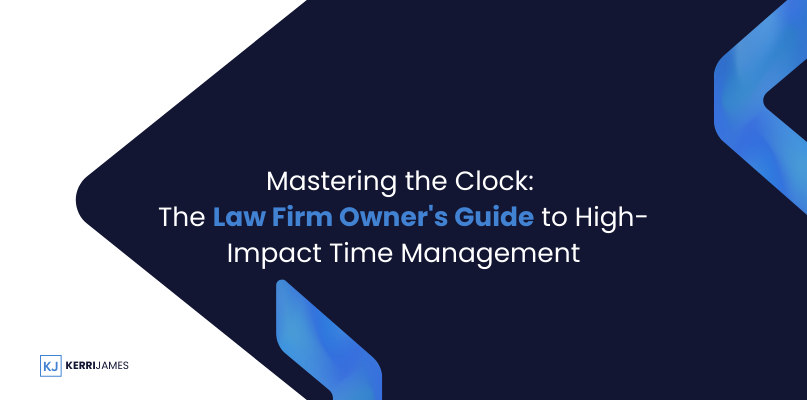Owning a law firm isn’t just about mastering legal arguments and winning cases; it’s about mastering the delicate and often daunting art of time management. As a law firm owner, you’re not just a lawyer; you’re an entrepreneur, a manager, a strategist, and a leader, juggling a multitude of responsibilities that constantly vie for your attention. Every minute, every hour is an investment, and just like any savvy investor, you need to ensure you’re getting the highest possible return on your most precious resource – your time.
This comprehensive guide dives deep into the heart of law firm time management, providing actionable strategies and insightful perspectives to help you reclaim control of your schedule, prioritize high-impact tasks, and design a work-life integration that fosters both professional success and personal fulfillment.
Shifting from Busywork to High-Leverage Activities: The Power of Strategic Prioritization
The life of a law firm owner is often characterized by a relentless sense of urgency, a feeling that there’s always more to do, more clients to serve, more deadlines looming. But simply being busy doesn’t equate to productivity or progress. In fact, it’s easy to fall into the trap of “busywork” – those seemingly urgent but ultimately low-impact tasks that consume your time and energy without moving the needle on your firm’s growth or your own professional fulfillment.
Think about those days that seem to vanish in a whirlwind of emails, phone calls, and administrative tasks, leaving you feeling exhausted but with little to show for your efforts. These are the days dominated by busywork, robbing you of the opportunity to focus on the strategic, high-value tasks that truly drive your firm’s success.
The key to escaping this cycle of busyness is to shift your mindset and your schedule towards high-leverage activities – those tasks that have a disproportionately positive impact on your firm’s success, even if they require more initial effort or don’t offer the instant gratification of checking off a to-do list.
Here’s how to identify and prioritize high-leverage activities:
Define Your Vision and Goals: Charting Your Course to Success What’s your long-term vision for your firm? Do you aspire to become a renowned specialist in a particular area of law, attracting high-profile clients and complex cases? Do you dream of expanding your client base to new markets, establishing a national or even international presence? Or perhaps your vision is to build a boutique firm known for its exceptional client service and tailored legal solutions? Clearly defining your vision and setting specific, measurable, achievable, relevant, and time-bound (SMART) goals provides a roadmap for your time and ensures you’re focusing on activities that align with your overall objectives. Without a clear vision and clearly defined goals, it’s easy to get sidetracked by short-term opportunities or the demands of others, ultimately leading you further away from your desired destination.
Identify Your Unique Value Proposition: What Sets Your Firm Apart? In a crowded legal marketplace, it’s essential to differentiate your firm and highlight the unique value you offer to clients. What sets your firm apart from the competition? What unique skills, experience, or perspectives do you bring to the table? Do you have a deep understanding of a niche area of law? Have you achieved significant victories in high-stakes litigation? Do you offer personalized client service and innovative legal solutions tailored to each client’s unique needs? Once you’ve identified your firm’s unique value proposition, delegate or outsource tasks that don’t directly leverage those strengths. For example, if your passion and expertise lie in courtroom litigation, consider delegating administrative tasks, legal research, or even certain aspects of client communication to others, allowing you to focus on what you do best – crafting winning legal strategies and advocating for your clients in court.
Apply the Pareto Principle (The 80/20 Rule): The Power of Unequal Distribution The Pareto Principle, also known as the 80/20 rule, suggests that roughly 80% of your results come from 20% of your efforts. This principle, while seemingly simple, has profound implications for time management. By identifying the 20% of your activities that generate the most significant outcomes – whether it’s networking with high-value clients, developing innovative legal strategies, securing media coverage, building strategic partnerships, or speaking at industry events – and ruthlessly prioritizing those tasks, you can significantly increase your impact and move closer to your goals. This often means making difficult choices, saying “no” to less-impactful opportunities, and learning to delegate or defer tasks that don’t fall within your high-impact zone.
Continuously Evaluate and Adjust: The Importance of Adaptability The legal landscape is constantly evolving, and so too should your approach to time management. What worked a year ago may not be the most effective strategy today. Regularly review your schedule, assess the impact of your activities, analyze your progress towards your goals, and be willing to adjust your approach to ensure you’re continuously focusing on the highest-leverage tasks that drive your firm’s growth and your own professional satisfaction. This could involve experimenting with new technologies, delegating tasks you previously handled yourself, or even outsourcing certain functions to external partners.
The Power of Delegation: Building a High-Performing Team and Multiplying Your Impact
As your law firm grows, so too does the need to delegate tasks effectively. Delegation isn’t just about freeing up your time, although that’s certainly a significant benefit; it’s about empowering your team, fostering their professional development, and building a more resilient, scalable, and ultimately more successful firm. By entrusting others with responsibility and empowering them to grow, you not only lighten your own workload but also create a more engaged, motivated, and high-performing team.
Here are key principles for effective delegation:
Hire Smart, Delegate Wisely: The Foundation of a Strong Team Investing in talented, reliable, and growth-oriented team members is essential for effective delegation. Seek out individuals who possess not only the necessary skills and experience but also a strong work ethic, a commitment to excellence, a positive attitude, a willingness to learn and grow, and a genuine interest in the success of the firm. When interviewing potential candidates, don’t just focus on their technical skills – assess their soft skills, their ability to work independently and as part of a team, and their overall fit with your firm’s culture and values.
Clearly Define Roles, Responsibilities, and Expectations: Setting the Stage for Success Ambiguity breeds confusion, inefficiency, and resentment. Before delegating any task, clearly outline the scope of the work, the desired outcomes, the level of autonomy expected, the deadlines involved, the reporting structure, and any relevant guidelines or best practices. Provide your team with the information, resources, training, and support they need to succeed, empowering them to take ownership of their work and feel confident in their ability to deliver exceptional results.
Match Tasks to Skill Sets, Interests, and Growth Goals: Fostering Engagement and Professional Development Delegate tasks strategically, considering each team member’s strengths, interests, professional development goals, and career aspirations. This not only ensures that tasks are handled effectively by those best equipped to handle them but also fosters a sense of engagement, job satisfaction, and loyalty among your team. By providing opportunities for growth and development, you demonstrate your investment in your team’s future and create a more fulfilling and rewarding work environment.
Provide Ongoing Feedback, Support, and Recognition: Nurturing Growth and Accountability Delegation is not a “set it and forget it” proposition. Regularly check in with your team, provide constructive feedback, offer support and guidance, address any challenges or roadblocks they may be facing, and celebrate their successes, both big and small. This fosters a culture of accountability, continuous improvement, open communication, mutual trust, and shared success.
Streamlining Operations: Leveraging Technology and Systems to Optimize Efficiency
In today’s digital age, there’s no excuse for clinging to outdated processes and manual tasks that can be easily automated or streamlined with technology. Embracing legal technology and implementing efficient systems can free up countless hours, reduce errors, increase accuracy, improve client service, and empower your team to work smarter, not harder.
Key areas where technology can revolutionize your law firm’s operations:
Case Management Software: The Backbone of a Modern Law Firm Investing in a robust case management system is no longer optional; it’s essential for any modern law firm serious about improving efficiency, client service, and profitability. Case management software centralizes all case-related information, automates document generation, streamlines communication with clients and colleagues, tracks deadlines and appointments, manages billing and invoices, and provides real-time insights into case progress, freeing up your team to focus on higher-level legal work.
Document Automation and E-Signature Tools: Saying Goodbye to Manual Processes Say goodbye to the days of manually drafting and editing standard legal documents, a process prone to errors, inconsistencies, and wasted time. Document automation tools allow you to create templates for frequently used documents like contracts, agreements, wills, and trusts, automatically populate them with client data from your case management system, and send them for e-signature, saving countless hours, reducing the risk of errors, and providing a more professional and streamlined client experience.
Cloud-Based Collaboration Platforms: Connecting Your Team and Clients in Real-Time Facilitate seamless collaboration among your team and with clients using cloud-based platforms like Google Workspace or Microsoft 365. Shared calendars, document storage and co-editing capabilities, video conferencing tools, instant messaging capabilities, and task management features keep everyone connected and informed, regardless of location. This real-time collaboration streamlines communication, reduces delays, and ensures everyone is on the same page, enhancing both internal teamwork and client service.
Legal Research and Analytics Tools: Unlocking the Power of AI for Legal Research AI-powered legal research tools can analyze vast databases of case law, statutes, legal precedents, secondary sources, and even regulatory filings in seconds, providing quick, accurate, and comprehensive insights to inform legal strategies and support case preparation. These tools can save lawyers countless hours of manual research, identify relevant case law that might have been missed using traditional methods, and provide data-driven insights to support legal arguments.
Building Your Business, Not Just Working In It: The Entrepreneur Within
As a law firm owner, it’s easy to get bogged down in the day-to-day operations of your firm, working in your business rather than in your business. This is the difference between being a lawyer who owns a firm and being a true entrepreneur who leads a firm to greater heights. While attending to client needs, managing cases, and ensuring the smooth operation of your firm are all essential, to truly achieve sustainable growth, build a thriving practice, and achieve your long-term vision, you need to carve out dedicated time to focus on the bigger picture – developing your firm’s strategy, nurturing client relationships, and building a brand that resonates with your target market.
Areas you should be working on in your business?
Strategic Planning and Business Development: Charting Your Firm’s Future Schedule dedicated time on a regular basis – whether it’s a few hours each week, a full day each month, or even a strategic planning retreat each quarter – to work on your firm’s strategic plan. This is your opportunity to step back from the day-to-day operations and focus on the big picture. This includes analyzing market trends, identifying growth opportunities, assessing competitor strategies, developing marketing and business development strategies, exploring new practice areas or niches, setting clear objectives for the future, and establishing key performance indicators (KPIs) to track your progress.
Client Relationship Management: Nurturing the Lifeblood of Your Firm Nurturing strong client relationships is essential for generating referrals, securing repeat business, building a loyal client base, and ensuring long-term growth. Schedule regular client meetings, phone calls, video conferences, or even virtual coffee chats, not just to discuss ongoing cases or legal matters but also to check in on their overall well-being, understand their evolving needs, share relevant legal updates, and explore opportunities to provide additional value beyond traditional legal services.
Networking and Building Strategic Partnerships: Expanding Your Reach and Influence Devote time to building relationships with other professionals in your field, attending industry events, joining legal associations, participating in online forums, and seeking out strategic partnerships that can expand your firm’s reach and influence. Networking can lead to new clients, valuable referrals, joint ventures, speaking engagements, media opportunities, and even collaborations on cases or projects.
Thought Leadership and Content Marketing: Positioning Yourself as an Expert and Attracting Ideal Clients Establish yourself and your firm as thought leaders in your practice areas by writing articles, blog posts, guest contributing to industry publications, creating webinars or podcasts, or even writing e-books that provide valuable insights and analysis on legal issues relevant to your target market. Content marketing not only showcases your expertise and builds credibility but also attracts potential clients who are actively seeking information and solutions related to your areas of practice.
Prioritizing Your Well-Being: Sustainable Success Requires Sustainable You
The relentless demands of running a law firm can take a toll on your physical and mental health. It’s easy to fall into the trap of overwork, neglecting your own well-being in the pursuit of professional success. Long hours, high-pressure situations, constant deadlines, and the emotional weight of handling sensitive legal matters can lead to stress, burnout, health problems, and strained personal relationships. But sustainable success requires a sustainable you. By prioritizing your physical health, mental well-being, and personal relationships, you’ll be better equipped to handle the challenges of law firm ownership, make sound decisions, maintain a positive outlook, and avoid burnout, ensuring that your pursuit of professional success doesn’t come at the cost of your personal well-being.
Here are essential self-care strategies for law firm owners:
Schedule Time for Yourself, Just Like You Would a Client Meeting: In the same way that you wouldn’t dream of canceling a client meeting at the last minute, treat your personal well-being with the same level of importance. Block out time in your calendar for exercise, meditation, yoga, spending time in nature, pursuing hobbies you enjoy, reading, listening to music, spending time with loved ones, or simply disconnecting from work and recharging your batteries. Treat these appointments with the same level of importance as any client meeting – they are non-negotiable commitments to your own well-being and ultimately contribute to your overall success.
Establish Healthy Boundaries Between Work and Personal Life: Protecting Your Time and Relationships Set clear boundaries between work time and personal time, and stick to them as much as possible. This might involve setting specific work hours, creating a dedicated workspace to separate work life from home life, silencing work notifications during personal time, avoiding checking emails or taking work calls outside of designated work hours, and communicating your boundaries to clients and colleagues. By setting and enforcing these boundaries, you protect your personal time, nurture your relationships, and allow yourself to fully disconnect and recharge when you’re off the clock, returning to work refreshed and re-energized.
Delegate and Outsource Tasks That Drain Your Energy: Reclaiming Your Time and Focus Identify tasks that consistently drain your energy, trigger stress, or simply don’t bring you joy, and delegate or outsource them whenever possible. This could include administrative tasks, bookkeeping, social media management, marketing tasks, IT support, or even certain aspects of legal research. By freeing yourself from these energy-draining tasks, you create more time and mental space to focus on your strengths, the tasks you enjoy, and the high-value activities that truly move the needle for your firm.
Seek Support from Mentors, Peers, or a Therapist: You Don’t Have to Go It Alone Running a law firm can be isolating at times, even in a firm with a collaborative and supportive culture. The weight of responsibility, the challenges of managing a business, and the emotional toll of dealing with legal matters can sometimes feel overwhelming. Connect with mentors, peers, a business coach, or even a therapist to share challenges, gain valuable perspectives from those who understand the unique demands of your profession, receive support and guidance, and develop strategies for navigating the ups and downs of entrepreneurship. Remember, seeking support is not a sign of weakness but a sign of strength and a commitment to your own well-being.
Mastering Your Time, Mastering Your Success
As a law firm owner, your time is your most valuable asset. It’s a finite resource that, once spent, can never be recovered. By mastering the art of time management, you gain the power to shape your firm’s destiny, achieve your professional goals, live a more balanced and fulfilling life, and make a meaningful impact on the lives of your clients and your community.
The journey begins with a shift in mindset – from simply being busy to focusing on high-impact activities that align with your vision and goals. It requires building a strong team, empowering them to grow, and delegating effectively. It demands embracing technology, streamlining operations, and constantly seeking ways to optimize efficiency. And perhaps most importantly, it requires prioritizing your own well-being, recognizing that sustainable success requires a sustainable you.
By implementing the strategies and insights outlined in this guide, you can transform your relationship with time, reclaiming control of your schedule and investing your most precious resource – the time you have each day to make a difference – in the people, projects, and pursuits that matter most.










